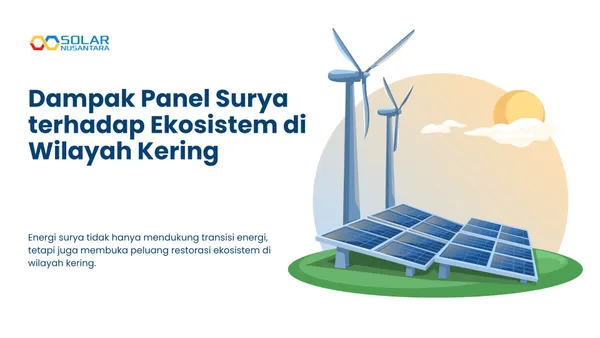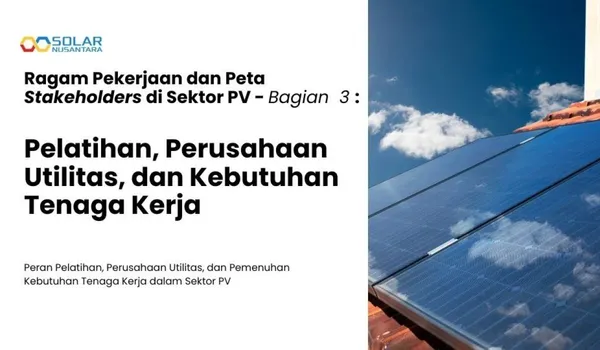
Dampak Panel Surya terhadap Ekosistem di Wilayah Kering
Energi surya tidak hanya mendukung transisi energi, tetapi juga membuka peluang restorasi ekosistem di wilayah kering.

Turunkan Biaya Operasional, Penuhi Target ESG. Solusi Energi Cerdas untuk Industri & Komersial.
Ubah atap pabrik, gedung, dan lahan tak terpakai Anda menjadi aset produktif. Solar-Nusantara.ID adalah mitra strategis Anda dalam merancang dan mengimplementasikan solusi energi terbarukan yang andal dan terukur.
Layanan kami dirancang untuk hasil bisnis yang nyata: dari instalasi panel surya skala besar yang memangkas OPEX secara signifikan, sistem manajemen energi untuk meningkatkan efisiensi pabrik, hingga solusi biomassa untuk mengurangi jejak karbon Anda.
Dapatkan informasi terbaru seputar energi terbarukan dan inovasi dari Solar Nusantara.

Energi surya tidak hanya mendukung transisi energi, tetapi juga membuka peluang restorasi ekosistem di wilayah kering.

Pelatihan, Perusahaan Utilitas, dan Kebutuhan Tenaga Kerja
Solar Nusantara memberikan berbagai manfaat, mulai dari penghematan biaya hingga kontribusi positif bagi lingkungan.
Solar Nusantara membantu lingkungan dengan mempromosikan penggunaan sumber energi bersih dan berkelanjutan, mengurangi dampak negatif dari bahan bakar fosil, serta berkontribusi pada masa depan yang lebih berkelanjutan.
Solar Nusantara menawarkan produk dan layanan energi terbarukan yang hemat biaya, serta membantu konsumen memanfaatkan tren menuju sumber energi yang lebih terjangkau dan berkelanjutan.
Solusi energi terbarukan terdepan untuk masa depan yang lebih hijau.
Dengan memanfaatkan keahlian dan pengalaman kami di bidang EPC Solar PV, Solar Nusantara membantu perusahaan meningkatkan efisiensi energi dan mengurangi biaya operasional.
Manajemen energi menjadi lebih mudah dengan GOLD, solusi terbaik untuk industri dan komersial. Sistem kontrol ini terintegrasi dengan pengumpulan data, analisis, dan pemantauan, yang mendukung tindakan ramah lingkungan.
Sistem PJUTS adalah solusi penerangan jalan umum tenaga surya yang efisien dan ramah lingkungan. Dirancang untuk memberikan penerangan optimal di berbagai area tanpa bergantung pada jaringan listrik konvensional.
Yang terbaik yang bisa Anda dapatkan
Sistem Panel Surya adalah solusi inovatif dan efektif untuk menghasilkan listrik dengan memanfaatkan energi matahari.
Baca Selengkapnya →Panel surya semakin populer sebagai sumber energi alternatif, dan panel TKDN dari SONUS menawarkan solusi yang terjangkau.
Baca Selengkapnya →SPKL adalah salah satu inovasi dari Sonus di bidang kendaraan listrik untuk infrastruktur pengisian daya yang efisien.
Baca Selengkapnya →Energi biomassa adalah sumber energi terbarukan yang dihasilkan dari bahan organik, seperti serbuk kayu dan limbah pertanian.
Baca Selengkapnya →Sumber daya listrik yang andal untuk Anda yang sering beraktivitas di daerah terpencil atau hidup tanpa bergantung pada jaringan listrik.
Baca Selengkapnya →Lihat lebih dekat bagaimana Solar Nusantara dapat membantu bisnis Anda.
Hubungi kami untuk informasi lebih lanjut dan mulailah perjalanan Anda menuju energi terbarukan.
Mendukung ESG dan Menghemat Energi Anda
Dapatkan keandalan, lupakan yang lain!
Di Mana Saja dan Independen